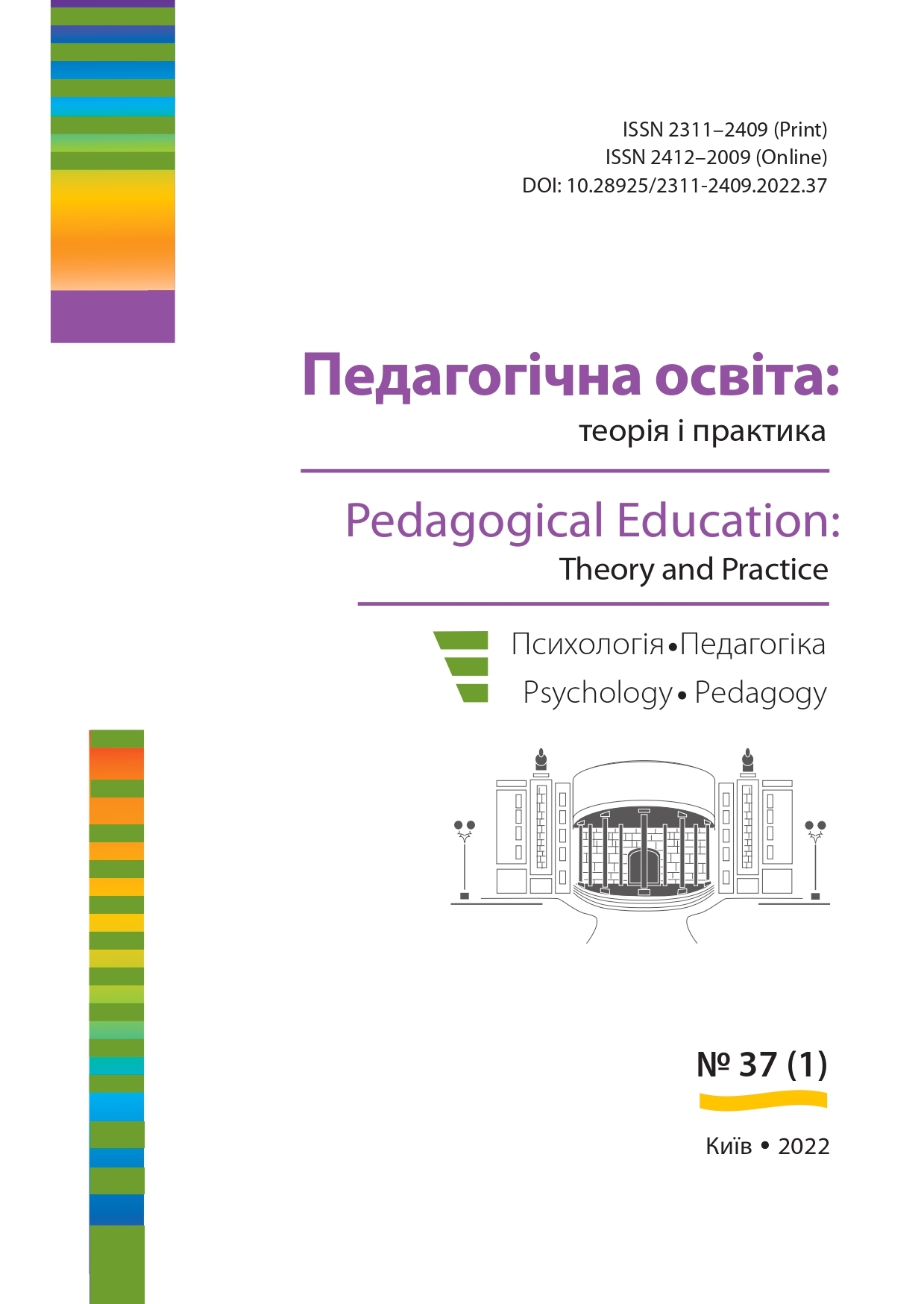The concepts of «innovation» and «novation» in educational and scientific discourse
DOI:
https://doi.org/10.28925/2311-2409.2022.3713Abstract
Mankind is currently experiencing an innovative type of progress in all areas of its activities, which is characterized
by rapid changes in technology and knowledge. First of all, it is a time of improving the basic sciences, improving
knowledge-intensive technologies and applied projects. This, in turn, requires, first, the formation of a new
type of person, which is characterized by innovative models of behavior and the implementation of acquired
knowledge; secondly, the perfect mastery of the ability of society to transform knowledge and innovations
produced by them into effective results of their own activities, to implement innovations in various spheres
of their lives. The ability to manage the mechanism of innovation will be a prerequisite for radical positive
changes in various spheres of human activity, including political, economic, spiritual and others. The key tool
for implementing these decisions should be innovation as a driver of society.
In accordance with the purpose of this study, the article provides a comparative analysis of the concepts
of «novation» and «innovation» in their dialectical relationship based on the work of domestic and foreign
scientists, revealed a general and specific vision of researchers on these phenomena; the essential characteristics
of the studied phenomena at the philosophical, general theoretical and empirical levels are determined. It is proved
that the concepts of «novation» and «innovation» have in common a common characteristic — renewal and
development, but a significant difference is how effective they will be in human activities. Analysis of scientific
discourse has shown that the studied concepts differ in the stages of life cycles, their features. The article considers
the specifics of innovations in the field of education, the reasons and features of their occurrence. The definitions
of «novation» and «innovation» are proposed, in particular in the context of education.
The material states that innovation should be a key tool for implementing educational reforms. It was also
emphasized that it is important to understand the specifics of both concepts, algorithms for their implementation
in order to effectively implement the new knowledge produced by members of society.
Downloads
References
Академічний тлумачний словник української мови в 11 томах. Режим доступу: http://sum.in.ua/
Гнітецький Є. Сутність та взаємозв’язки між базовими категоріями теорії інновацій //
Ефективна економіка, 2012. № 8. Режим доступу: http://www.economy.nayka.com.ua/?op=1&z=1492
Закон України «Про інноваційну діяльність» від 04.07. 2007р. № 40-IV (зі змінами і доповненнями). Режим доступу: https://zakon.rada.gov.ua/laws/show/40-15#Text
Лапин Н. Актуальные проблемы исследования нововведений в организационных системах. М.:
ВНИИСИ, 1980. 114 с.
Маркетинг і менеджмент інноваційного розвитку: монографія / за заг. ред. д.е.н., проф.
С.М. Ілляшенка. С.: ВТД «Університетська книга», 2006. 728 с.
Положення про порядок здійснення інноваційної освітньої діяльності від 22.09.2017
№ 1171/31039. Режим доступу: https://zakon.rada.gov.ua/laws/show/z1171-17#Text
Полонська Л. Інноваційна політика торговельних підприємств : теорія та методологія /
Л. А. Полонська, Н. В. Лохман. Д.: ДонНУЕТ, 2009. 221 с.
Супрун А.Г. Філософські основи феномену інноваційності в умовах транзитивного суспільства // Науковий вісник НУБІП України. Серія: Гуманітарні студії, 2017, с.27-35. Режим доступу:
http://journals.nubip.edu.ua/index.php/Gumanitarni/article/viewFile/9598/8584
Хоружа Л. Соціально-психологічні аспекти переходу педагогічного знання в інновацію /
Л. Хоружа // Освітологічний дискурс, 2021. № 4 (35). С. 103 — 117.
Режим доступу: https://od.kubg.edu.ua/index.php/journal/article/view/884/674
Цюняк О. Філософське осмислення поняття «інноваційна діяльність» // Молодий вчений: педагогічні науки, №5 (69), 2019. Режим доступу: http://molodyvcheny.in.ua/files/journal/2019/5/38.pdf
Чумак О. Соціально-філософський аналіз поняття «інновація» та «інноваційна діяльність» //
Гуманітарний вісник Запорізької державної інженерної академії, 2009. Вип. 36. С. 152-165. Режим
доступу: http://nbuv.gov.ua/UJRN/znpgvzdia_2009_36_16
REFERENCES
Akademichnyi tlumachnyi slovnyk ukrainskoi movy v 11 tomakh. Retrieved from http://sum.in.ua/
[Academic explanatory dictionary of the Ukrainian language in 11 volumes]. Access mode: http://sum.in.ua/
[in Ukrainian].
Arystotel. (1981). Bolshaia etyka. [Great ethics.] Sochynenyia. V 4-kh t. T. 4 : perevod / Vstup. statia
y prymech. Y.D. Rozhanskyi. Moskva : Mysl, 1981. S. 295–373.
Hnitetskyi Ye. (2012). Sutnist ta vzaiemozviazky mizh bazovymy katehoriiamy teorii innovatsii
[The essence and relationships between the basic categories of innovation theory] // Efektyvna ekonomika,
№ 8. Retrieved from http://www.economy.nayka.com.ua/?op=1&z=1492 [in Ukrainian]
Zakon Ukrainy «Pro innovatsiinu diialnist» vid 04.07. 2007r. № 40-IV (zi zminamy i dopovnenniamy).
[Law of Ukraine «On Innovation» of 04.07. 2007 № 40-IV (as amended).] Retrieved from https://zakon.rada.
gov.ua/laws/show/40-15#Text [in Ukrainian]
Marketynh i menedzhment innovatsiinoho rozvytku (2006) : [Marketing and management of innovation
development]: monohrafiia / za zah. red. d.e.n., prof. S.M. Illiashenka. — S.: VTD «Universytetska knyha».
s. [in Ukrainian]
Polozhennia pro poriadok zdiisnennia innovatsiinoi osvitnoi diialnosti vid 22.09.2017 № 1171/31039.
[Regulations on the procedure for carrying out innovative educational activities dated 22.09.2017
№ 1171/31039] Retrieved from https://zakon.rada.gov.ua/laws/show/z1171-17#Text Access mode: https://
zakon.rada.gov.ua/laws/show/z1171-17#Text [in Ukrainian]
Polonska L. (2009). Innovatsiina polityka torhovelnykh pidpryiemstv : teoriia ta metodolohiia [Innovative
policy of trade enterprises: theory and methodology] / L. A. Polonska, N. V. Lokhman. D.: DonNUET,. 221
s. / L. A. Polonskaya, NV Lokhman. D .: DonNUET, 2009. 221 p. [in Ukrainian]
Suprun A.H. (2017). Filosofski osnovy fenomenu innovatsiinosti v umovakh tranzytyvnoho suspilstva
[Philosophical bases of the phenomenon of innovation in the conditions of a transitive society] // Naukovyi
visnyk NUBIP Ukrainy. Seriia: Humanitarni studii, s.27-35. Retrieved from http://journals.nubip.edu.
ua/index.php/Gumanitarni/article/viewFile/9598/8584 // Scientific herald of NULES of Ukraine. Series:
Humanities Studies, 2017, p.27-35. Access mode: http://journals.nubip.edu.ua/index.php/Gumanitarni/
article/viewFile/9598/8584 [in Ukrainian]
Khoruzha L. (2021). Sotsialno-psykholohichni aspekty perekhodu pedahohichnoho znannia
v innovatsiiu [Socio-psychological aspects of the transition of pedagogical knowledge into innovation] /
L. Khoruzha // Osvitolohichnyi dyskurs, № 4 (35). S. 103–117. Retrieved from https://od.kubg.edu.ua/index.
php/journal/article/view/884/674 / L. Khoruzha // Educational Discourse, 2021. № 4 (35). P. 103 — 117.
Access mode: https://od.kubg.edu.ua/index.php/journal/article/view/884/674 [in Ukrainian]
Tsiuniak O. (2019). Filosofske osmyslennia poniattia «innovatsiina diialnist» [Philosophical
understanding of the concept of «innovation»] // Molodyi vchenyi: pedahohichni nauky, №5 (69), 2019.
Retrieved from http://molodyvcheny.in.ua/files/journal/2019/5/38.pdf // Young scientist: pedagogical
sciences, №5 (69). [in Ukrainian]
Chumak O. (2009). Sotsialno-filosofskyi analiz poniattia «innovatsiia» ta «innovatsiina diialnist»
[Socio-philosophical analysis of the concept of «innovation» and «innovation»] // Humanitarnyi visnyk
Zaporizkoi derzhavnoi inzhenernoi akademii, Vyp. 36. S. 152-165. Retrieved from http://nbuv.gov.ua/
UJRN/znpgvzdia_2009_36_16 // Humanitarian Bulletin of the Zaporozhye State Engineering Academy,
Vol. 36. pp. 152-165. Access mode: http://nbuv.gov.ua/UJRN/znpgvzdia_2009_36_16 [in Ukrainian]

